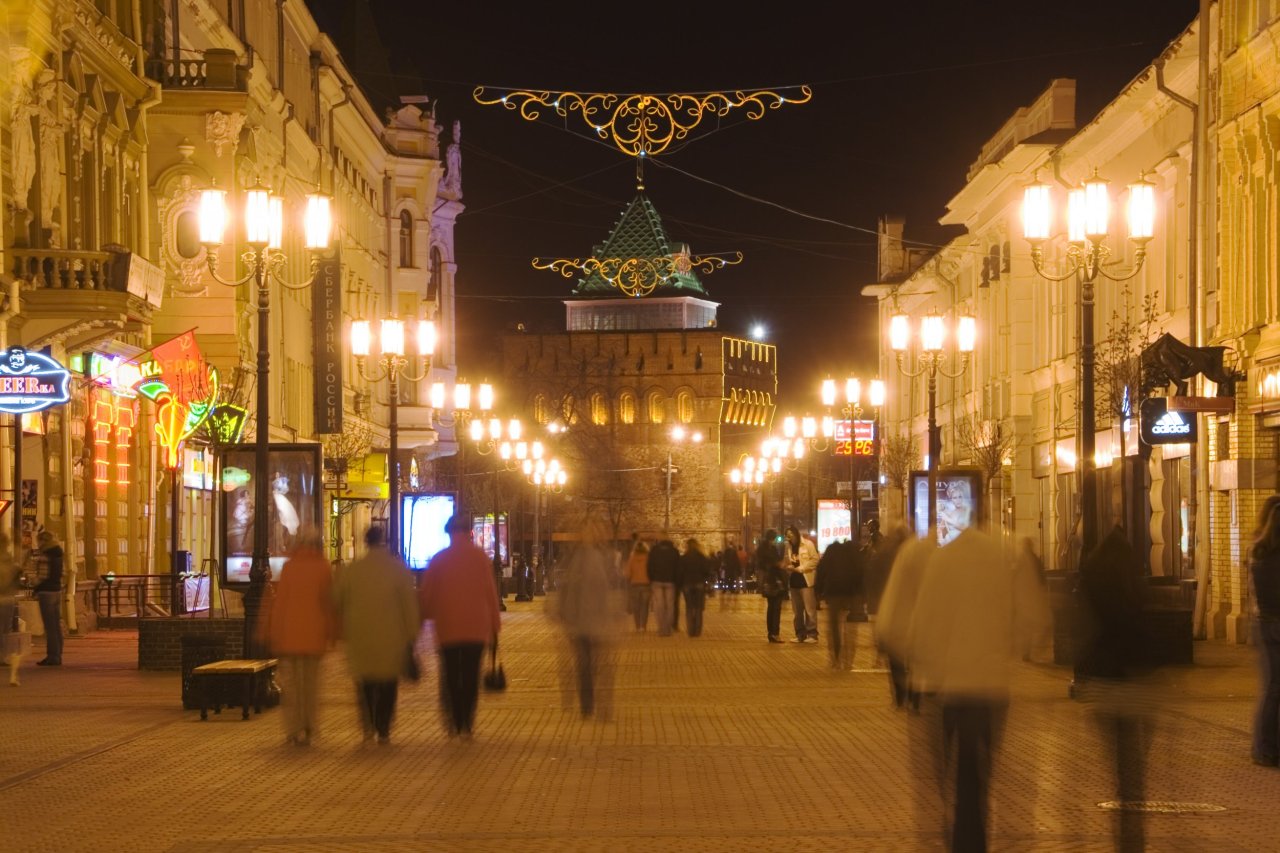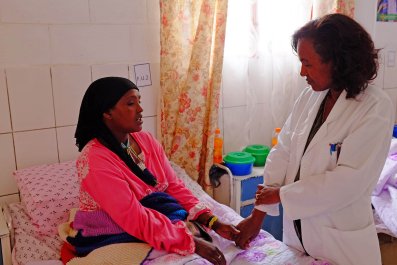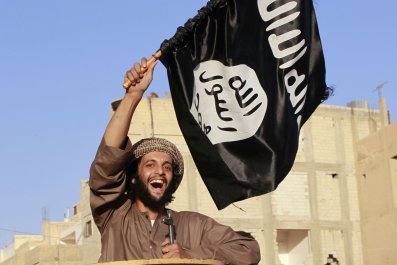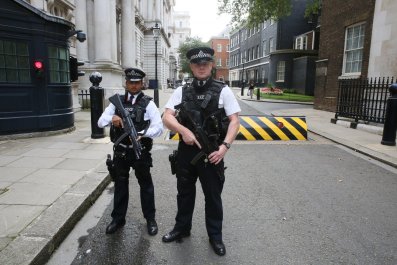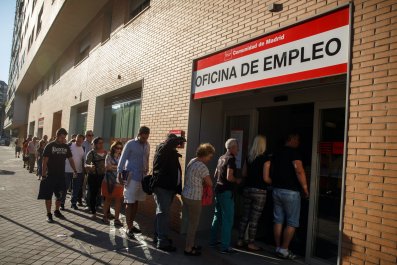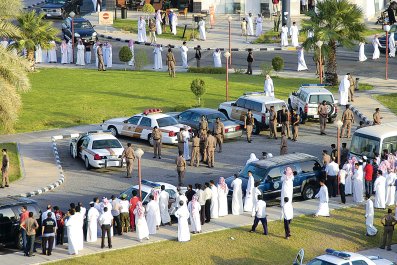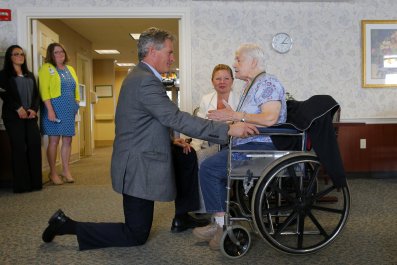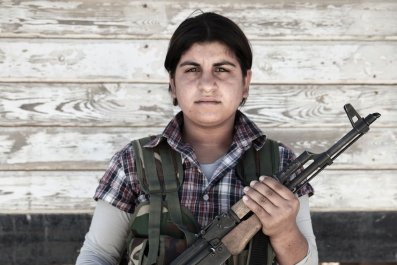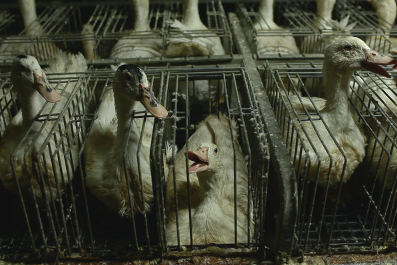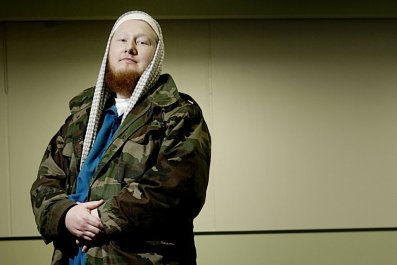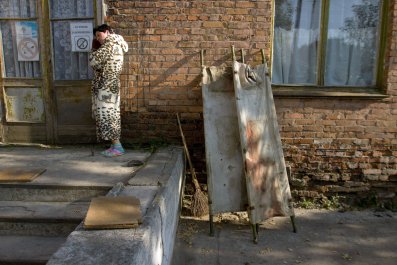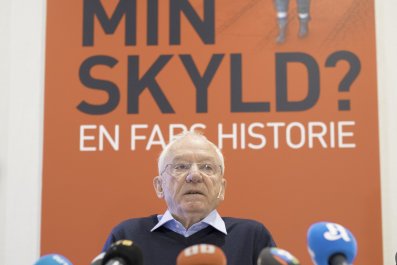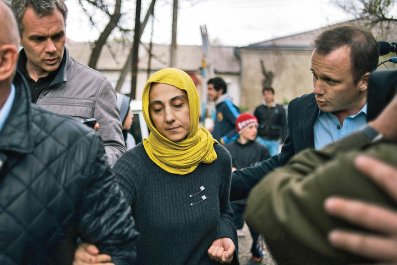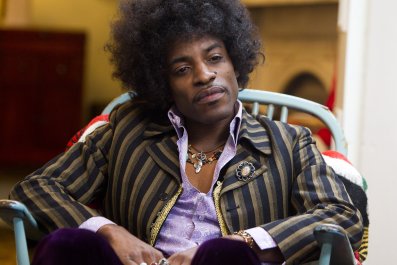Vitaly Ivanov's feet feel so heavy he can barely get out of bed. But with difficulty, and some pain, he manages to leave his apartment just in time for the hospital appointment to find out the results of his liver biopsy. In the chilly autumn rain, Ivanov trudges through the streets around his home city of Nizhny Novgorod, a 57-year-old single man who is about to discover he has an untreatable cancer.
His story is typical of his place and time in Russia. In fact, he has already lived two years longer than many millions of his fellow Russian men. Russia is facing a demographic crisis that is seldom addressed by its leaders or its people: the population is falling dangerously fast.
Ivanov lives in a two-bedroom apartment by the Yuzhnoye Highway in Nizhny Novgorod, usually called "Nizhny" by Russians. It is a run-down industrial district called Avtozavod, home to a giant automobile plant that, in the last five years, has laid off more than 7,000 employees, including Ivanov.
As he glumly says, Avtozavod "just sucks". He is lonely, particularly on the day of his last hospital visit. "It's a proper day to get drunk," he says. But then admits that many days are like that. He can't find anybody to accompany him to the oncology unit, which scares him because the entrance takes them directly past the morgue.
When Ivanov was young and healthy, like most most men in the neighborhood, he liked to mooch around the desolate street corners, sharing a drink or two with his friends. The drink anaesthetised him and what he called his "wounded heart". He and his male chums would curse their wives or their bosses, or the evil West that always wishes the worst for Russia. Then he lost his job, his wife left him and most of his close friends from the area died. That was not surprising for Russia, where at least a quarter of men die before reaching the age of 55, mostly from cardiovascular problems. Alcohol is one of the main problems in Nizhny, but by no means the only one.
In 2014, Ivanov's hometown achieved an unenviable distinction: in the first six months of the year, 26,350 people died and only 18,700 babies were born – the population of Nizhny shrunk by 7,600 people in six months, its highest ever death rate. No bombs fell on the city during the period, no epidemics hit, no natural disasters struck its population. For the past two years Nizhny had been the fifth fastest shrinking city in the world. "This is a quiet war. People in Nizhny Novgorod die without protest, without complaints," local environmentalist Akhat Kayumov says.
But the public believes the rumour mill and conspiracy theories. Officials and political leaders never talk about the city's alarming death rate. "So people believe a myth, like the one that the Kremlin needs no more than about 50 million people to provide services for gas and oil pipes, and the rest of Russia can die," Kayumov adds. Russia's population is about 140 million.
Last month, activists of Dront, a group of local environmentalists, prepared a report about the reasons for Nizhny Novgorod's shrinking population. It was the first serious study of the problem and showed an alarming increase in the number of diagnosed cancers – just in the first half of the year, 3,579 people died of cancer and 14,102 from heart diseases. It is profoundly depressing for a city in the heart of Russia, a cultural centre, with 793 years of history, traditionally good universities, beautiful architecture, a newly built subway system, highways and great museums.
Why is Nizhny dying? Ecologists urged the governor, Valery Shantsev, to spend more than just 0.5% of the region's budget on improving the environment. They say public health suffered directly from toxic pollution that has badly affected the city's drinking water. One of the city's biggest neighbours is Dzerzhinsk, a large industrial center for the production of chemicals. "But so far, we have not heard of any plans for improvement," says Kayumov. "Unfortunately, governor Shantsev sees us as his enemies, who are trying to diminish Nizhny Novgorod's attractiveness for investors."
Russia's population started to fall in the early 1990s, when the ruble devalued and millions of people lost their sense of security, along with most of their savings. Families stopped breeding. The entire idea of giving birth and raising a child amidst the economic chaos of the post-Communist years of the 1990s sounded terrifying to young families. But for the first time in decades the population began to increase last year, albeit very slightly, and the trend has continued in the first 6 months of 2014, when women living across Russia, including the territory of annexed Crimea, gave birth to 1.2 million babies – 15,000 more than the number of deaths. But according to demographers this is a blip before the country enters another, even deeper "demographic pothole", experts say. "Russia has not managed to beat the depopulation crises. What we see now is a temporary tendency, a result of the baby boom of 1980s," Igor Beloborodov, one of Russia's leading demographers, explains.
"Many fewer girls were born in the 1990s and unlike the previous generation, women reaching maternity age have a much weaker motivation to become mothers – by 2020, Russia will face another wave of disappearing population," he warns.
Population experts explain that cities like Nizhny are dying so fast because of a low fertility rate. In 1991, when the Soviet Union collapsed, fewer than one baby was born per woman, meaning there are few young adults around today to have children. Environmentalists blame the pollution, doctors blame poor public knowledge of healthcare; local political activists blame corrupt and uncaring authorities, and lack of transparency about the dying population.
Just a couple of decades ago, the city of Nizhny Novgorod, called Gorky at the time, was the third largest Russian city by population after Moscow and Leningrad, as St Petersburg was then known. For decades it was closed for foreign tourists due to its secret military productions of weapons, military jets and submarines. It absorbed workers from all the villages surrounding the city. Gorky was proud of its giant automobile plant producing trucks and Volga automobiles. Economic reforms reshuffled the old system; many factories did not manage to catch up with competition and closed.
Young families gave priorities to careers, rather than to babies. Thousands of the most active and talented professionals moved out of Nizhny every year in search of a better life. Fast-speed trains to Moscow, just 400km away, took away the best minds. Two decades ago Nizhny was Russia's third largest city. Since then its population has fallen by 11% to 1.2 million and now it is fifth. The city is "living with more graves than cradles", says Sergei Chesnokov, the head of Moscow-based For Life foundation.
"For a while, Putin provided Russians with a sense of stability," says Chesnokov. But the Ukraine crisis has again made people "fear that a social explosion might happen in Russia. Values, motivations have changed, the new generation don't want to reproduce."
Young women give a variety of reasons for their decision to wait before getting pregnant. But vast numbers are saying that is how they feel. Among them is 28-year-old doctor Yelena Sorokina, who qualified at the Semashko hospital, where Ivanov is being treated for liver cancer. "I have decided not to have a baby in Russia," Sorokina, a glamorous brunette with smooth long hair says. Instead of a stuffy hospital, she has chosen to work at a luxurious beauty salon in the city centre.
Meanwhile, the wife of the mayor of Nizhny Novgorod chooses to live, for long periods of the year, not in grim, polluted Nizhny, but in either of the two villas the mayor owns in Cannes, in the south of France. Nobody knows for sure how the family acquired the money to buy the villas, but as a member of the Russian Parliament, Dmitry Gudkov, says: "We call the mayor the 'Golden Cookie Mayor'." Rumours about corruption in the city have have been rife for years. And the mayor's administration has total control over the local media – hence no coverage of Nizhny's demographic crisis.
But the gloomy statistics cannot be ignored for ever. Recently, the deputy head of the federal service of statistics, Yelena Gruzdeva, admitted: "Unfortunately, among Russian cities with a population of a million or more, Nizhny Novgorod has the highest death rate."
Vitaly Ivanov, the former factory engineer, forces himself from under the covers and drags his skinny body to the kitchen to make a cup of tea. He had just returned to his apartment from the oncology clinic, which confirmed the diagnosis he feared. The bus journey to the hospital took an exhausting hour each way and the short walk at either end seemed miles long.
Of existence in Nizhny Novgorod Ivanov concludes: "We just die out, as flies and nobody remembers us."



